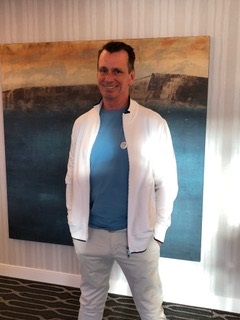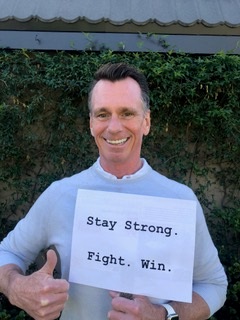After spending over 20 years in the hospitality field, Bob Iles changed careers and joined the stock brokerage industry before retiring almost six years ago. He and his husband live in Palm Springs, CA, where he enjoys swimming in his lap pool, hiking, biking, volunteering for environmental and LGBTQ+ causes, and working with those facing cancer.
My diagnosis and treatment
In November 2019, I developed a concerning cough that led me to make an appointment with my doctor. After imaging tests and a biopsy, I learned I had small cell lung cancer (SCLC). I was shocked, but I refused to let lung cancer intimidate me. I told myself right from the start that I would fight and win.
My care team quickly sprang into action, and we developed a treatment plan that included 10 months of chemo, radiation, immunotherapy, and prophylactic cranial irradiation (PCI). I am lucky to have gone through those treatments with very few side effects. I did not have any nausea or neuropathy and had very little hair loss until the cranial irradiation caused all of my hair to fall out. (It’s since grown back a little thicker and with less gray!)
Stay strong. Fight. Win.
When I was first diagnosed, my husband said we were going to “stay strong, fight, and win!” Those words, “stay strong, fight, win,” became our mantra throughout the process. It still is to this day. We lost my mother-in-law to lung cancer nine years earlier, and I vowed I would not subject my husband to losing someone to cancer again.
Simply put, the mantra gave me something to focus on and to believe in. I have it printed in vinyl letters that I stuck to my bathroom mirror. Still, to this day, whenever I feel weak or unsure of anything, I stand there, look at each word, focus on it, and remind myself that staying strong and fighting is what it takes to win.
I also read “Love, Medicine, and Miracles” by Dr. Bernie Seigel, which reinforced what I already knew – that I could be my best advocate by knowing that my attitude would make a big difference in my outcome. I still remind myself daily that I refuse cancer, I reject cancer, and I will not accept cancer. Approaching lung cancer with this attitude helped me ignore negative thoughts. There was no room for the negative when I focused on the positive.
Advice for others facing a lung cancer diagnosis
The minute I heard the word “cancer,” it seemed like my whole world suddenly changed and that life as I’d known it was over, but I learned that that doesn’t need to be the case. Yes, there were changes, but most were temporary. I found that I could get through the treatments, the side effects, and the upheaval to my daily routine and the routines of those around me and that gave me the strength to keep going.
To others diagnosed with lung cancer – I would say to take things one day at a time and don’t think too much about what might happen. Also, know that your attitude can help to mold your future. You shouldn’t worry about side effects like nausea, hair loss, and neuropathy. Treatments are getting better every day, and not everyone experiences these side effects. Instead, focus on managing each day while also envisioning a future without cancer.
I also encourage everyone to get a second opinion. Doing so will confirm what the first doctor recommends or provide you with other options for treatment.
Becoming a GO2 Phone Buddy
 A little over two and a half years since my initial diagnosis, I reached out to GO2 to become a Phone Buddy and volunteer my time talking with others who have a similar diagnosis. Many people find they want guidance from someone who also experienced what they are going through or feel like they need to talk to someone outside of their circle of family and friends. This is true even for those with a loving and supportive group of family and friends. I volunteer because I like to help people in general and because I have the perspective of someone who’s fought cancer too.
A little over two and a half years since my initial diagnosis, I reached out to GO2 to become a Phone Buddy and volunteer my time talking with others who have a similar diagnosis. Many people find they want guidance from someone who also experienced what they are going through or feel like they need to talk to someone outside of their circle of family and friends. This is true even for those with a loving and supportive group of family and friends. I volunteer because I like to help people in general and because I have the perspective of someone who’s fought cancer too.
Life lessons
I know it sounds cliché, but of course, I have a new-found appreciation for every day since my diagnosis. Part of it may be just me getting older, but I embrace each day, knowing I’m lucky to get the privilege of waking up.
I also look at others differently now because I know that you can never tell what a person is going through when you pass them in the grocery store, sit next to them in a movie theater, or pull up behind them in traffic. I had my bad days during treatment but didn’t show it on the surface. Many people are fighting battles we can’t see, and I try to be more forgiving.
If reading Bob’s story inspires you to want to be matched with a Phone Buddy or to become a Phone Buddy yourself, click here to learn more.


Leave A Comment